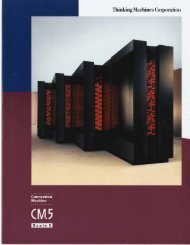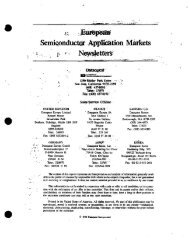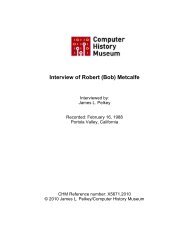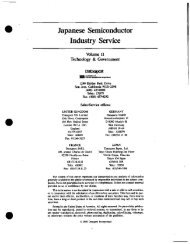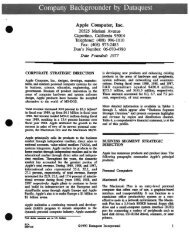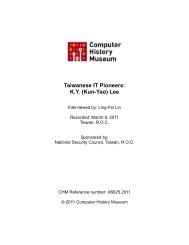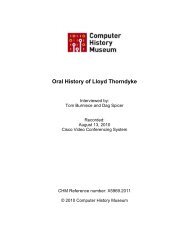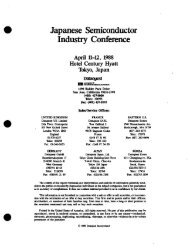Oral History of Robert Everett - Computer History Museum
Oral History of Robert Everett - Computer History Museum
Oral History of Robert Everett - Computer History Museum
You also want an ePaper? Increase the reach of your titles
YUMPU automatically turns print PDFs into web optimized ePapers that Google loves.
<strong>Oral</strong> <strong>History</strong> <strong>of</strong> <strong>Robert</strong> <strong>Everett</strong><br />
But at the same time you can fire them if you don't want them or need them, if they don't do the proper<br />
jobs and so on. And so these people are not buried in a bureaucracy with very strong tenure rules. You<br />
can fire anybody you want. You have to pay them, but you can fire them. So I think it's an alternative<br />
solution to that problem. I've tried it on various people, and they've said, "Oh, yeah. Uh-huh.” But it<br />
makes sense to me.<br />
Hendrie: It would seem there might be one other advantage in that I would suspect a MITRE might have<br />
a better chance <strong>of</strong> recruiting and maintaining unusually talented people.<br />
<strong>Everett</strong>: Oh, it does. That's one <strong>of</strong> my points. The government…<br />
Hendrie: Well, the government. Who wants to work…if you're really smart why are you working for the<br />
government?<br />
<strong>Everett</strong>: There are some very smart people working there, but they're scarce unless you can get up to<br />
the top where the rewards and power and accomplishment are great enough to make up for the troubles<br />
and lack <strong>of</strong> money and whatnot. But that's right. And that's the fundamental thing. You want a strong<br />
organization that has to be flexible. Strong, flexible organization. It's very difficult to get it in the<br />
government. Now the industrial people say, "We can do that. We've got great people." But it turns out that<br />
it's very difficult for them to do that at the same time that they're competing for business. It's like getting<br />
your house built by your architect. <br />
Hendrie: Usually doesn't work out so well. There are exceptions.<br />
<strong>Everett</strong>: There are exceptions. The right kind <strong>of</strong> skilled person or outfit can do that. Particularly if they are<br />
successful enough to be snotty with people who want them to do things that don't make sense. But the<br />
trouble that industry has is that government is always asking them to do something silly, and they don't<br />
have the steel in them to refuse.<br />
Hendrie: You spent the…after you moved on to MITRE, you initially worked on the SAGE portion <strong>of</strong><br />
MITRE?<br />
<strong>Everett</strong>: Me?<br />
Hendrie: Yes, you.<br />
<strong>Everett</strong>: I was the technical director.<br />
Hendrie: You were the technical director for all <strong>of</strong> the technical…<br />
CHM Ref: X3877.2007 © 2007 <strong>Computer</strong> <strong>History</strong> <strong>Museum</strong> Page 51 <strong>of</strong> 56



